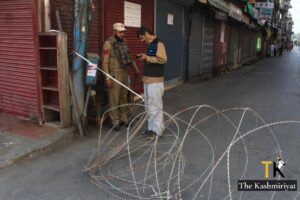
Kounsar Bashir/ Insha Mushtaq Dar
Aqib Rashid, a 22-year-old student from Kulgam district returned to Bangalore the last week. He is an under-graduate student pursuing pharmaceutical studies from a college in Bangalore.
Aqib says that it was the first time he went home after July 2019. “These communications lockdowns are the worst we (Kashmiris) have seen. In 2019, worried about our families’ safety back home, we resorted to prayers,” Aqib told The Kashmiriyat.
A presidential order on 5 August 2019 revoked Articles 370 and 35A of the Indian Constitution, which granted Jammu Kashmir special autonomous status.
The move stripped Jammu Kashmir of its political autonomy and was accompanied by a complete lockdown, unprecedented in Kashmir’s history, that began in August 2019 and continued through March 2020.
During the lockdown, schools were closed, access to healthcare was severely disrupted, livelihoods reliant on internet connection were brought to a standstill, and protection risks increased.
While the strongest measures were subsequently eased, including re-opening of schools, internet was restored in 2020.
The communication lockdown in Kashmir made thousands of Kashmiris lose their jobs. Industries and workers have been unable to recover economically from the lockdown period.
Thousands of Kashmiris working or living outside Kashmir underwent a traumatic period with their families trapped inside Kashmir. Everyone was worried, but they had no means to communicate or know about the whereabouts of their families.
Once again, a communication blockade was imposed in Kashmir on Wednesday evening after the demise of senior most Hurriyat leader, Syed Ali Shah Geelani, who died of prolonged illness at his residence in Hyderpora, Srinagar.
The Jammu Kashmir Police immediately declared that the internet will be snapped in the valley. Curfew like restrictions have been imposed and people have been asked to not come out of their houses. At around 2 p.m. phone calling services, too, were snapped cutting Kashmiris from the world, again.
“All we can do is hope that our families are fine. But there are no means to know if they actually are,” Aqib asserts.

No information
Communication blockades are not new to the Kashmiris. Kashmir has seen months long blockades over communication in the years – 2010, 2016, as well. The unilateral abrogation of special status of Jammu Kashmir in 2019 is afresh in the minds of people.
As panic over the abrogation of Article 370 escalated inside the Kashmir valley, Kashmiris living outside found themselves grappling with uncertainty. They sruggled to contact their families and failed.
“It is something that we have been trying to heal for the past two years now. And here we have another lockdown in Kashmir,” says Ayesha who is a post graduate student from Kashmir, studying in Jamia Milia Islamia.
“My parents had to travel a distance of dozens of miles to be able to reach the office of the Deputy Commissioner Anantnag so they could talk to me. They used to wait for several hours to be able to talk to me, as there were other families who wanted their family members outside Kashmir to know that they were not killed yet,” Ayesha remembers.
Similarly, for Adil Shafi, a Bhopal based Kashmiri working as a manager in a private Firm said that on August 04 2019, when he spoke to his parents, they sought more information about what was happening. They called me several times during the lockdown from the DC office Budgam. “When I heard them for the first time in September. I cried with a sigh of unusual relief on knowing that they were alive.”
Anxious over this fresh lockdown, Kashmiris, on social media, have been expressing a sense of anxiety, exclusion and humiliation. Others on the internet are making hateful remarks against the demise of the veteran Hurriyat leader, Syed Ali Shah Geelani.
Kashmir has lived through the exodus of an entire community. It has endured civilian uprisings and blockades.
Kashmir that has seen civilian deaths reduced to a statistic is witnessing an era where silence has become the order of the day.
With less information inflow from the Valley, people try to gather and send as many messages as possible.
“I have been trying to call them since yesternight, i do not know much about Geelani. I work here for my family, but now unwillingly I too have been involved in this. The complications are multi-fold. This is just mentally taxing,” Adil feels.
An American Kashmiri, wishing to maintain anonymity worried about her parents’ safety said, “There is little news available and it only seemed to deepen anxiety.”
“There is no good news from anywhere. My mind is thinking about all the bad things, but I just wish that someone keeps lying to me about my family’s safety,” she said.
